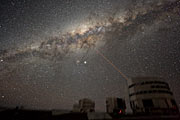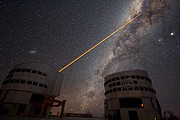Press Release
The Planet, the Galaxy and the Laser
Inspiring Images from Paranal
2 August 2007
On the night of 21 July, ESO astronomer Yuri Beletsky took images of the night sky above Paranal, the 2600m high mountain in the Chilean Atacama Desert home to ESO's Very Large Telescope. The amazing images bear witness to the unique quality of the sky, revealing not only the Milky Way in all its splendour but also the planet Jupiter and the laser beam used at Yepun, one of the 8.2-m telescopes that make up this extraordinary facility.
"The images are not composite", emphasises Yuri Beletsky. "The camera was being tracked on the stars, which can be easily noticed if you look at the telescope domes on the image (they look a little fuzzy). The colour of the laser beam on the first image actually looks pretty close to what one can see on the sky with the unaided eye."
Most striking in the images is the wide band of stars called the Milky Way. Spanning more than 100 degrees in the first of these images, it shows the dust and stars that are part of our own Galaxy, a spiral galaxy containing about 100 billion stars.
In the middle of this image, two bright objects are also seen. The brighter of the two is the planet Jupiter. The other is the bright star Antares. Another bright star, Alpha Centauri, one of the closest stellar neighbours to the Sun, is visible at the middle-left edge of the image.
Three of the four domes that shelter the 8.2-m VLT's Unit Telescopes are visible on the first image. Streaming out of Yepun, Unit Telescope number 4, is the laser beam used to create an artificial star above Paranal, aiming directly at the centre of our own Galaxy.
At the time the pictures were taken, astronomers were indeed using the SINFONI instrument (see eso0426) to study the Galactic Centre, having a close look at the supermassive black hole that lurks in there.
With so many stars visible from the exceptional site of Paranal, one may wonder why it is necessary to create another, artificial, star? The answer lies in the very sophisticated instruments that are used on ESO's VLT. Some of them, such as NACO and SINFONI, make use of adaptive optics, a technique that allows astronomers to overcome the blurring effect of the atmosphere. This means that astronomers obtain images almost as good as if the whole telescope was placed in space, above Earth's atmosphere.
Adaptive optics, however, requires a nearby reference star that has to be relatively bright, thereby limiting the area of the sky that can be surveyed. To surmount this limitation, astronomers now use at Paranal a powerful laser that creates an artificial star, where and when they need it (see eso0607 and eso0727).
Launching such a powerful laser from a telescope is state-of-the-art technology, whose set-up and operation is a continuous challenge. As seen from the images, this is, however, a technology that is now well mastered on Paranal.
The images were obtained with a digital camera and 10-mm optics, mounted on a small equatorial mount, and are each the result of a single 5 minute exposure.
Contacts
Yuri Beletsky
ESO
Chile
Email: ybialets@eso.org
About the Release
| Release No.: | eso0733 |
| Legacy ID: | PR 33/07 |
| Name: | Milky Way Galactic Centre |
| Type: | Milky Way : Sky Phenomenon : Night Sky |
| Facility: | Very Large Telescope |
Our use of Cookies
We use cookies that are essential for accessing our websites and using our services. We also use cookies to analyse, measure and improve our websites’ performance, to enable content sharing via social media and to display media content hosted on third-party platforms.
ESO Cookies Policy
The European Organisation for Astronomical Research in the Southern Hemisphere (ESO) is the pre-eminent intergovernmental science and technology organisation in astronomy. It carries out an ambitious programme focused on the design, construction and operation of powerful ground-based observing facilities for astronomy.
This Cookies Policy is intended to provide clarity by outlining the cookies used on the ESO public websites, their functions, the options you have for controlling them, and the ways you can contact us for additional details.
What are cookies?
Cookies are small pieces of data stored on your device by websites you visit. They serve various purposes, such as remembering login credentials and preferences and enhance your browsing experience.
Categories of cookies we use
Essential cookies (always active): These cookies are strictly necessary for the proper functioning of our website. Without these cookies, the website cannot operate correctly, and certain services, such as logging in or accessing secure areas, may not be available; because they are essential for the website’s operation, they cannot be disabled.
Functional Cookies: These cookies enhance your browsing experience by enabling additional features and personalization, such as remembering your preferences and settings. While not strictly necessary for the website to function, they improve usability and convenience; these cookies are only placed if you provide your consent.
Analytics cookies: These cookies collect information about how visitors interact with our website, such as which pages are visited most often and how users navigate the site. This data helps us improve website performance, optimize content, and enhance the user experience; these cookies are only placed if you provide your consent. We use the following analytics cookies.
Matomo Cookies:
This website uses Matomo (formerly Piwik), an open source software which enables the statistical analysis of website visits. Matomo uses cookies (text files) which are saved on your computer and which allow us to analyze how you use our website. The website user information generated by the cookies will only be saved on the servers of our IT Department. We use this information to analyze www.eso.org visits and to prepare reports on website activities. These data will not be disclosed to third parties.
On behalf of ESO, Matomo will use this information for the purpose of evaluating your use of the website, compiling reports on website activity and providing other services relating to website activity and internet usage.
Matomo cookies settings:
Additional Third-party cookies on ESO websites: some of our pages display content from external providers, e.g. YouTube.
Such third-party services are outside of ESO control and may, at any time, change their terms of service, use of cookies, etc.
YouTube: Some videos on the ESO website are embedded from ESO’s official YouTube channel. We have enabled YouTube’s privacy-enhanced mode, meaning that no cookies are set unless the user actively clicks on the video to play it. Additionally, in this mode, YouTube does not store any personally identifiable cookie data for embedded video playbacks. For more details, please refer to YouTube’s embedding videos information page.
Cookies can also be classified based on the following elements.
Regarding the domain, there are:
- First-party cookies, set by the website you are currently visiting. They are stored by the same domain that you are browsing and are used to enhance your experience on that site;
- Third-party cookies, set by a domain other than the one you are currently visiting.
As for their duration, cookies can be:
- Browser-session cookies, which are deleted when the user closes the browser;
- Stored cookies, which stay on the user's device for a predetermined period of time.
How to manage cookies
Cookie settings: You can modify your cookie choices for the ESO webpages at any time by clicking on the link Cookie settings at the bottom of any page.
In your browser: If you wish to delete cookies or instruct your browser to delete or block cookies by default, please visit the help pages of your browser:
Please be aware that if you delete or decline cookies, certain functionalities of our website may be not be available and your browsing experience may be affected.
You can set most browsers to prevent any cookies being placed on your device, but you may then have to manually adjust some preferences every time you visit a site/page. And some services and functionalities may not work properly at all (e.g. profile logging-in, shop check out).
Updates to the ESO Cookies Policy
The ESO Cookies Policy may be subject to future updates, which will be made available on this page.
Additional information
For any queries related to cookies, please contact: pdprATesoDOTorg.
As ESO public webpages are managed by our Department of Communication, your questions will be dealt with the support of the said Department.


